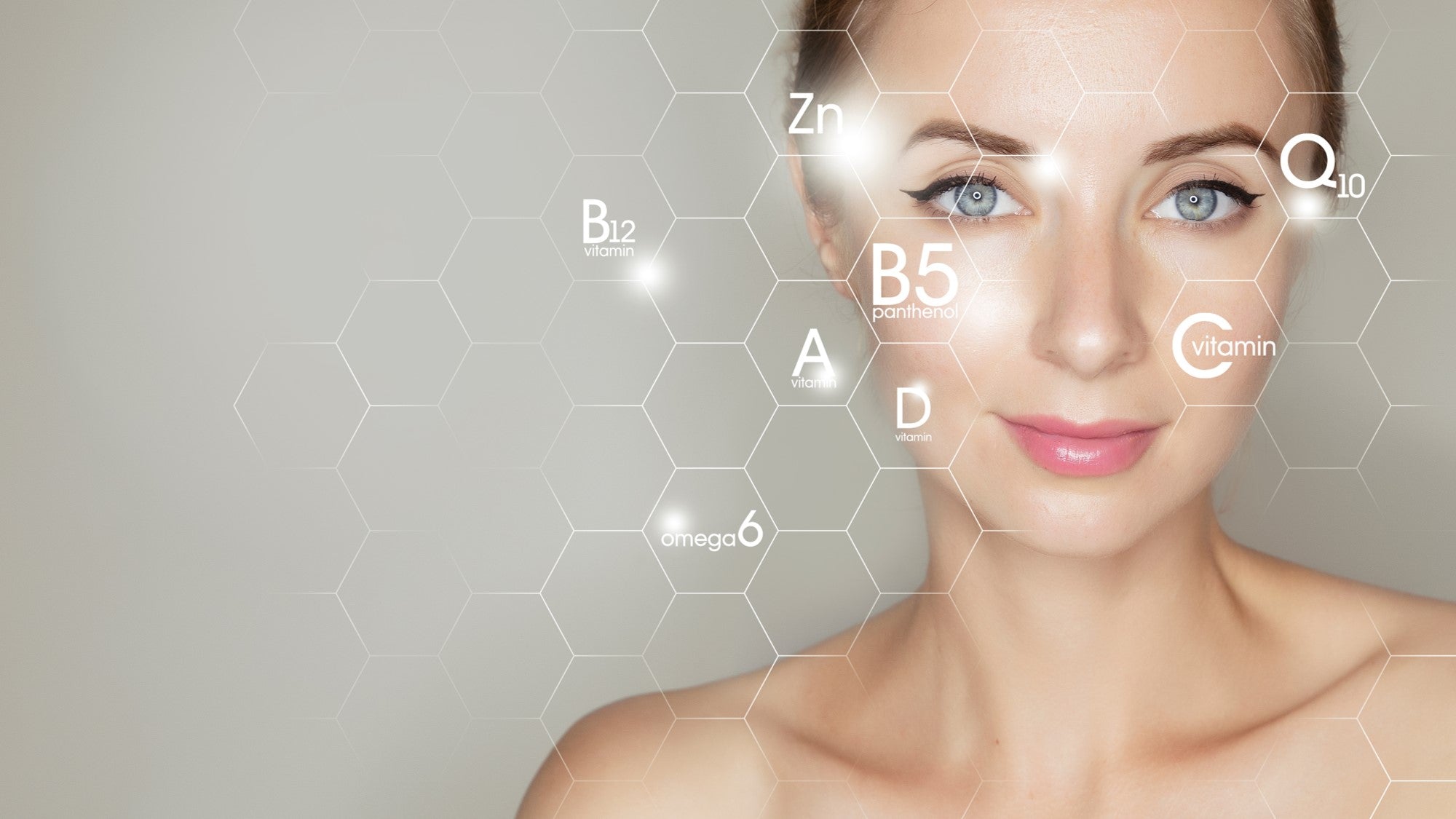
Dr. Eric Venn-Watson’s Highlights
- Looking for the fountain of youth? You might just find it in one of these anti-aging supplements, shown to support your body as it ages.
Medically reviewed by: Eric Venn-Watson, MD
Maybe you first thought about aging in your late 30s, maybe it was your 40s. Regardless of your age, you’ve landed here because you’re concerned about aging and want to make sure you do everything you can to be proactive in staying healthy as you get older.
You know the foundational practices that keep you youthful through the aging process: a healthy and diverse diet, staying active and mobile, and engaging in activities with the people you love. But what about supplements?
Many anti-aging supplements have flooded the market, and it can be difficult to determine which of them actually offer any health benefits versus which of them aren’t backed by science.
We’ll help you sort through the supplement rabble and give you our top five anti-aging supplements that are backed by research to help support your body as you get older.
Let’s first talk about how aging works and what happens to your body as you get older.
How Aging Works
Our bodies are made up entirely of cells. Specific cells make up specific tissues that make up organs, and those organs make up systems that keep our bodies functioning. Most of the cells in our bodies have specific life expectancies. For instance, skin cells regenerate every 28 days.
Other cells remain with us our entire lives. As we age, our cells begin to break down, and the rate at which our cells regenerate slows down. Our mitochondria, which give our cells the energy they need, become sluggish with age. Less energy in the cell equates to less energy in the overall body.
When our cells begin to lose their function, tissues become damaged, organs don’t function as they should, and ultimately, we can see the breakdown and disruption of entire systems in our bodies.
It’s important to look at aging at the cellular level since that’s where it starts. Even visible signs of aging, like fine lines and wrinkles, start with skin cells that are simply fragile, weak, and more susceptible to damage than healthy, youthful cells.
Sure, a wrinkle cream may hydrate your skin and make fine lines and wrinkles look less noticeable; but what if you could fight the signs of aging before they start, deep within your skin cells?
The Main Keys to Aging Well
There are a few ways you can ensure you age healthfully and maintain as much function and cognitive ability as possible as you get older.
Healthy diets.
Food can truly be medicine if you’re eating the right things. It can also help you make sure your cells are getting the vital nutrients and vitamins they need to carry out their cellular function properly.
Eating a healthy diet isn’t simply a matter of counting calories, it’s about creating a diet that is robust with fruits, vegetables, proteins, and healthy fats. Your cells need all these ingredients to work like they should.
Eating a diet full of foods with potent antioxidant properties, vitamin C, vitamin E, vitamin A, vitamin D, and natural amino acids can support your skin health from the inside out.
Elevate your cells. Elevate your self.
Exercise.
You hear it from your doctor with each yearly exam: you need to exercise. Whether you’re an exercise aficionado or a novice, getting your heart rate up several times a week takes care of your heart health, helps you feel better, and supports your overall mobility.
Exercising as you age reduces your risk of developing metabolic syndrome, a cluster of diseases that place a person at a higher risk for stroke and heart disease. Regular exercise is also a great way to prevent falls and injury as you get older.
Protecting cognitive health.
Ask anyone who’s recently retired and they’ll likely tell you they don’t feel as sharp as they did while at work. The reason? They aren’t actively using their brains to problem solve, communicate with others, and make critical decisions as much.
Studies show that cognitive function declines once you retire, so it’s crucial to make sure you’re engaging in activities that challenge you mentally. Whether you take up crossword puzzles, engage in conversation with others, or read books, it’s a vital part of taking care of your body as it ages.
These are the basics of maintaining your health as you age. If you want to do more to help your body age healthfully, you can consider using supplements.
Where Supplements Can Help with Aging
Supplements can help you by providing a number of benefits.
- They fill in dietary gaps. Most of us don’t eat quite as well as we should. Even if we are healthy eaters, there’s a chance that dietary restrictions or allergies could be limiting us from certain nutrients we need. Supplements can help you make sure you’re getting everything your body needs to function properly.
- They can help support systems that naturally decline as you age. There are specific supplements that you can take to help improve your cognitive function, give your skin a healthier glow, and even give you more energy. Taking a supplement can help support specific needs and challenges you may face as you age.
- They can help improve your cellular function. Supplements can help strengthen your cells and give them a fighting chance to last longer and function better. Be careful, though. Not all supplements are created equally. It’s important to find supplements that have enough scientific backing to be considered effective.
If you’re thinking a supplement could help you age more healthfully, we’ve got five supplements you can try.
5 Supplements with Anti-Aging Properties
Ready to go supplement shopping? Don’t leave without our tried and true list of research-backed supplements to help support your body as you get older.
1. Curcumin
Curcumin is a compound found in turmeric, which is available in supplement form. Curcumin is a powerful antioxidant, which means it can help your body fight off free radical damage.
Curcumin has also been studied for its ability to help encourage cellular turnover. Curcumin can activate certain proteins that help prevent your cells from reaching a state of senescence (the stage where cellular turnover slows to a virtual stop).
Turmeric also offers potent anti-inflammatory properties when taken in the right amount and in the right form. Many users find taking turmeric can alleviate discomfort from aching joints and muscle discomfort. It’s a great, all-natural alternative for alleviating age-related pain. One thing to note is that a major barrier to curcumin’s clinical efficacy is its poor bioavailability.
2. Green Tea
Your afternoon macha isn’t just delicious, it’s also helping your body stay youthful, longer. The active compounds in green tea, called polyphenols, have been linked to reduced risk of age-related diseases like type 2 diabetes, heart disease, and stroke.
Green tea also acts as an antioxidant thanks to its flavonoids, and helps your skin stay resilient against the visible signs of aging, like fine lines and wrinkles in older adults. You can find green tea extract supplements to fill in the gaps in your diet and support the overall health of your aging skin.
3. Collagen
Collagen is a household term for most of us. Whether we grew up with our mothers and fathers seeking collagen-boosting injections, or have tried them ourselves, we know that collagen is a foundational part of our skin structure and that without it, our skin looks older than we want it to.
Collagen is one of the most abundant proteins in the body, and collagen production supports youthful looking skin. Collagen is what plumps the skin, keeps it firm, supports healthy skin elasticity and skin hydration, and fills in areas where wrinkles could form.
As you get older, your skin produces less and less collagen. The collagen decline starts around age 30, and continues to slow every consecutive year.
Taking collagen supplements can help support more abundant collagen levels, and can also help your body produce more of its own collagen. This is skin care from the inside out. Collagen is also helpful for cushioning joints and keeping us mobile, so you’ll support more than just your skin with a dietary supplement of collagen.
4. CoQ10
Coenzyme Q10 is an enzyme naturally occurring in your body, but as you get older, your CoQ10 levels can begin to decline. CoQ10 helps keep us energetic, plays a role in supporting healthy cell function, and may even play a role in healthy cognitive function.
Supplementing with CoQ10 may help you feel sharper and more energetic.
5. Pentadecanoic Acid (C15:0)
Pentadecanoic acid is relatively new to the supplement scene, but this little fatty acid has been helping preserve cellular longevity for decades.*
Pentadecanoic acid, also known as C15:0, is an odd-chain, saturated fatty acid that an increasing body of research shows may be the first essential fatty acid to have been discovered in 90 years.†
First studied in dolphins, this acid helps promote healthy aging directly at the cellular level by:*
- Strengthening cellular membranes. C15:0 is a sturdy fatty acid that helps support cellular structure and ensure cells are protected from external stressors.
- Boosting mitochondrial function. C15:0 helps supercharge your cell’s mitochondria, which equates to better cellular function and performance.
- Supporting red blood cell health and heart health.
- Encouraging healthy metabolism.
C15:0 is a scientific research-backed supplement that can help support your body as you age and give your cells a fighting chance against the decline they experience as they age.* You can take C15:0 in its pure, powder form, by taking fatty15, the first and only C15:0 supplement available.
The Takeaway
You can support your body and age healthfully by eating a diverse diet, exercising regularly, reducing sun exposure, and using supplements that support your body as it ages. C15:0 helps support your cells, which is where the effects of aging start.
Fatty15 gives your cells what they need to help them function better, for longer.*
Sources:
Exercise as you get older | National Health Service

Eric Venn-Watson M.D.
CEO, Co-Founder
Senior Scientist, Co-Founder
Eric is a physician, U.S. Navy veteran, and Co-founder and COO of Seraphina Therapeutics. Eric served over 25 years as a Navy and Marine Corps physician, working with the special forces community to improve their health and fitness. Seraphina Therapeutics is a health and wellness company dedicated to advancing global health through the discovery of essential fatty acids and micronutrient therapeutics.
You May Also Like...
The Definitive Guide to Aging's Role in Human Longevity
Aging is a complex biological process impacting health and longevity, requiring a distinction between chronological age, biological age, and psychological age to understand its nuances
7 Proven Ingredients That Boost Anti‑Aging Benefits Naturally
The quest for healthy aging has evolved into evidence-based science, identifying specific nutrients that support cellular health and longevity.


